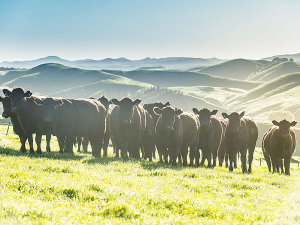Editorial: Happy days
OPINION: The year has started positively for New Zealand dairy farmers and things are likely to get better.
 The programme will lower the beef sector's greenhouse gas emissions by delivering gas emissions by delivering cows with a smaller environmental hoof-print.
The programme will lower the beef sector's greenhouse gas emissions by delivering gas emissions by delivering cows with a smaller environmental hoof-print.
Dairy farmers are set to benefit from a $17 million beef genetics programme backed by the red meat sector and the Government.
Beef+Lamb New Zealand (B+LNZ) is providing $10m towards the seven-year project Informing New Zealand Beef, the Ministry for Primary Industries will provide the balance.
The project is expected to result in more efficient cows within the next 25 years. The programme is targeting a 10% reduction in greenhouse gas emissions per kilogram of product produced.
Agriculture Minister Damien O'Connor says the programme will lower the beef sector's greenhouse gas emissions by delivering cows with a smaller environmental hoof-print.
"The cows most suited to New Zealand's production systems will be moderate in size, but still highly productive. Moderate sized cows which require less feed will help to lower the impact on soils and produce less methane," says O'Connor.
"To date we've relied on an Australian beef genetics framework, but the time is right to create our own programme tailored to New Zealand conditions."
B+LNZ chief executive Sam McIvor says the programme capitalises on New Zealand's world-leading skills and knowledge in sheep genetics and applies them to the beef industry.
"The data tells us that our beef industry has been lagging behind on genetic progress," he says.
"Not only will this give the industry better genetic tools, but a major focus of the programme is to work with commercial farmers to increase understanding and grow confidence in using genetic information to drive productivity and profitability."
McIvor says dairy farmers also stand to benefit significantly.
"With these new production-focused genetic selection tools, dairy farmers will be able to select semen from beef bulls for artificial insemination in their herds, more confident that they will have shorter gestation, easy calving and produce more valuable calves."
According to the latest Fresh Produce Trend Report from United Fresh, 2026 will be a year where fruit and vegetables are shaped by cost pressures, rapid digital adoption, and a renewed focus on wellbeing at home.
The Roar is a highlight of the game hunting calendar in New Zealand, with thousands of hunters set to head for the hills to hunt male stags during March and April.
OPINION: The past few weeks have been tough on farms across the North Island: floods and storms have caused damage and disruption to families and businesses.
European dairy giant Arla Foods celebrated its 25th anniversary as a cross-border, farmer-owned co-operative with a solid half-year result.
The sale of Fonterra’s global consumer and related businesses is expected to be completed within two months.
Fonterra is boosting its butter production capacity to meet growing demand.
OPINION: Fonterra may be on the verge of selling its consumer business in New Zealand, but the co-operative is not…
OPINION: What does the birth rate in China have to do with stock trading? Just ask a2 Milk Company.